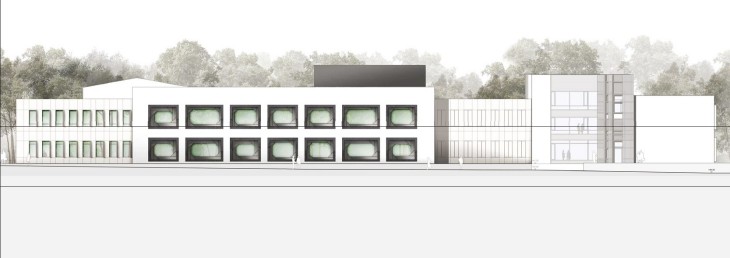Expansion of Biomaterial Sciences in Teltow: New Construction of the Biomedical Technology Centre III
The Institute of Biomaterial Science of the Helmholtz-Zentrum Geesthacht in Teltow will hold its groundbreaking ceremony for the construction of the new Biomedical Technology Centre III on June 13th, 2014. The event marks the third phase of construction at the Teltow research campus and will be attended by Brandenburg’s Research Secretary Dr. Sabine Kunst and by Chairman of the Board at the Helmholtz-Zentrum Geesthacht, Assistant Secretary Wilfried Kraus.

Die Fertigstellung des neuen Institutsgebäudes ist für 2016 geplant. Bauzeichnung: Reiner Becker Architekten BDA
The new institute building, scheduled for completion in 2016, will generate new opportunities for biomaterial sciences in the Berlin-Brandenburg region.
Scientific Director of the Helmholtz-Zentrum Geesthacht Dr. Wolfgang Kaysser explains, “With the expansion of the research location in Teltow-Seehof, the unique infrastructure required for interdisciplinary cooperation in the research field of ‘biomaterial-based technologies for regenerative medicine’ will be created, further expanding the potential of the site for the Brandenburg region.”
The floor space, measuring approximately 3300 square metres, offers room for specialized research groups as well as for high-tech laboratories, such as a chemistry technology centre that allows for flexibility.
Approximately Ten Million Euros for the Building Expansion
The construction costs for the new research facility, which run around ten million Euros, were financed by grants from the state of Brandenburg. The Helmholtz-Zentrum Geesthacht will also provide additional resources for the research campus Teltow—particularly for technical equipment. Wolfgang Kaysser says, “The state of Brandenburg has been supporting this research location sustainably for several years. We welcome this significant investment by Brandenburg in the Teltow site.
The site itself as well as the region and the state of Brandenburg will gain short-term and long-term benefits from this investment.” New collaborative projects will be created with industry partners as well as with the Free University of Berlin, which will fund the laboratory equipment for the respective working groups. The new two-storey complex will be connected to the Biomedical Centre II, which was completed in 2011, and is planned as a conceptual unit for centralized laboratory and office use. A total of more than eighty employees will work in the Biomedical Technology Centre III.
An Additional 1.8 Million Euros Granted for High-Resolution Microscopy
Brandenburg’s Research Secretary Dr. Sabine Kunst will also present a grant of more than 1.8 million Euros to the Institute of Biomaterial Science in Teltow on June 13th, 2014. This financial support is granted through the state of Brandenburg within the funding program “Future through Research—Research Excellence Support for Investment in Non-University Facilities.” The program is financed by the European Regional Development Fund (ERDF). The Helmholtz-Zentrum Geesthacht also provides 600,000 Euros for new microscopes and an additional 500,000 Euros for the infrastructural housing of these microscopes.
The Teltow institute plans to apply the funds toward obtaining two much-needed high-performance scientific instruments: a transmission electron microscope and a high-resolution laser scanning microscope. With the help of these two microscopic techniques, the relationships and pathways between living cells and polymeric materials can be observed down to the nanometre range. The researchers wish to investigate transport pathways from what are known as “nanocarriers” between cells and into the cells. Nanocarriers are developed in Teltow from polymeric biomaterials and transport other substances such as drugs directly to diseased cells. The research on the reciprocal influence of nanocarriers and the body’s own cells is of particular importance with regard to the development of new forms of therapy.
Contact
Institute of Biomaterial Science
Phone: 03328/352-490
Fax: 03328/352-452
E-mail contactHelmholtz-Zentrum Geesthacht
Kantstr. 55, 14513 Teltow
